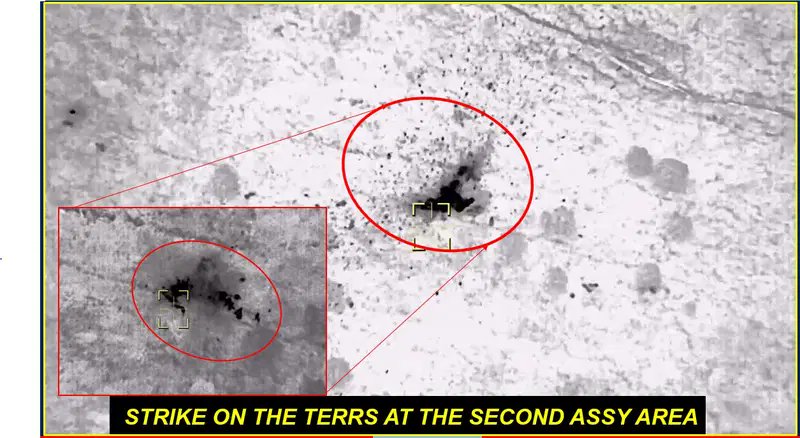
Nigerian Air Force Delivers Crushing Blow as 35 Terrorists Neutralised in North East Strikes

The Nigerian Air Force has unleashed yet another devastating show of firepower in the fight against terrorism, confirming on Saturday that its aircraft under Operation Hadin Kai neutralised more than 35 terrorists in a series of precision strikes.
The operation, which unfolded in the rugged terrain of the North East, is being hailed as a significant victory in the ongoing campaign to dominate the battlespace and deny insurgents the ability to regroup or stage attacks against innocent civilians and security forces.
According to official statements, the strikes were carefully planned and executed as part of intensified efforts to consolidate recent gains in the fight against insurgency.
Military intelligence had tracked movements of armed terrorists who had converged in a known hideout, believing themselves safe from detection. What they did not know was that the Nigerian Air Force was watching from above, ready to unleash its arsenal. When the moment came, precision-guided bombs rained down on the enemy, leaving destruction in their wake and sending shockwaves through the terrorist ranks. By the time the dust settled, at least 35 fighters had been confirmed neutralised, with others fleeing in disarray.
Operation Hadin Kai has become the backbone of Nigeria’s counterterrorism push in the North East, combining air power with ground offensives to dismantle terrorist networks that for years wreaked havoc on communities. Saturday’s strikes mark not just a tactical win, but a psychological one, demonstrating once again that the Nigerian military retains the upper hand in the theatre of conflict. The language of the Air Force statement was clear: these operations are designed to dominate the battlespace and ensure that terrorists no longer enjoy freedom of action, a strategic shift that underscores the government’s determination to end years of bloodshed.
For communities in Borno and Yobe states, where much of the insurgency has been concentrated, news of the air strikes offers relief and renewed hope. For too long, villages in these areas have lived under the constant threat of raids, ambushes, and abductions, with terrorists exploiting difficult terrain and porous borders to launch their attacks. But with operations like Hadin Kai, the Nigerian Air Force is sending a blunt message: there will be no hiding place. Every gathering, every training camp, every movement of fighters can be tracked and destroyed in a matter of minutes.
This development also speaks volumes about the growing sophistication of Nigeria’s military operations. Precision strikes of this scale require not only advanced weaponry but also reliable intelligence and coordination. It means surveillance assets are working, ground informants are feeding accurate information, and strike pilots are hitting their targets with ruthless efficiency. For the terrorists, it is another reminder that the era of impunity is over, and that the skies above them are no longer silent—they are hunting grounds.
Security analysts believe the death of more than 35 fighters in a single operation will deal a heavy blow to the morale of terrorist cells, many of which are already fractured by internal rivalries, leadership struggles, and dwindling resources. Every loss of fighters and weapons chips away at their capacity to wage war, while simultaneously emboldening the military to press forward. It is a war of attrition, and on Saturday, the balance tilted further in Nigeria’s favour.
The Nigerian Air Force has long been one of the most decisive arms of the country’s counterinsurgency efforts, often turning the tide in battles where ground troops face stiff resistance. Its involvement under Operation Hadin Kai has been credited with dismantling notorious hideouts, decimating supply lines, and halting planned offensives before they materialise. With each strike, the credibility of the insurgents erodes, and their grip on vulnerable communities loosens.
Yet, the success of the strikes is not just measured by the body count. It is measured by the breathing space given to displaced families to return to their homes, by the confidence restored to farmers who dare to till their fields again, and by the assurance offered to children that the sound of aircraft overhead is no longer a prelude to terror but a promise of safety. These intangible victories form the true backbone of Nigeria’s campaign, and every strike amplifies them.
The Nigerian people, who have endured years of terror in the North East, will view Saturday’s operation as both vengeance and justice. For every market bombed, every school attacked, every village burnt by insurgents, each precision strike carries the weight of collective pain and collective resilience. It is more than a military maneuver; it is the voice of a nation saying enough is enough.
But the fight is not over. Experts warn that while operations like this are crucial, the long-term battle against terrorism also requires intelligence sharing, cross-border cooperation, rehabilitation programs, and addressing the root causes of extremism. Air strikes win battles, but sustained peace will only come when the ideology of terror is starved of oxygen. Still, for now, Nigerians can take solace in knowing their armed forces are not relenting.
The message from Saturday’s operation is unmistakable. In the skies above the North East, Nigeria is in control. With over 35 terrorists neutralised in a single blow, Operation Hadin Kai has once again shifted momentum in the military’s favour. And as the nation watches, the Nigerian Air Force has made it clear that every inch of the battlespace will be contested, every hideout will be exposed, and every terrorist who dares to challenge the sovereignty of the state will be hunted down and eliminated.
For a country that has endured the scars of insurgency for over a decade, this latest victory is more than news—it is a declaration of intent. The war may not yet be over, but on Saturday, Nigeria won another vital battle.


